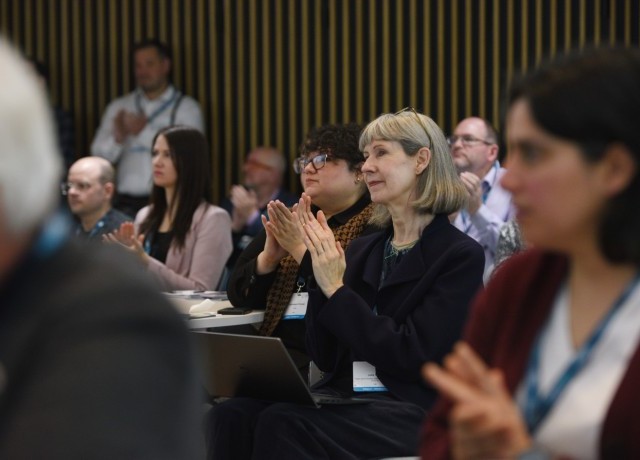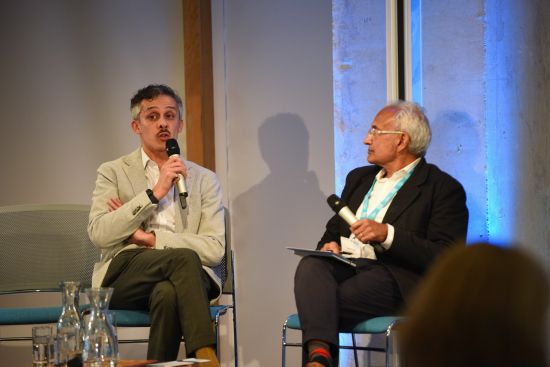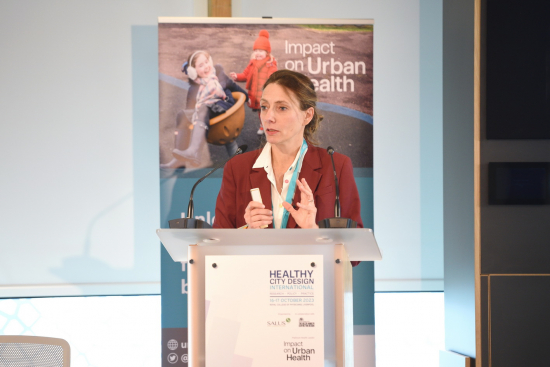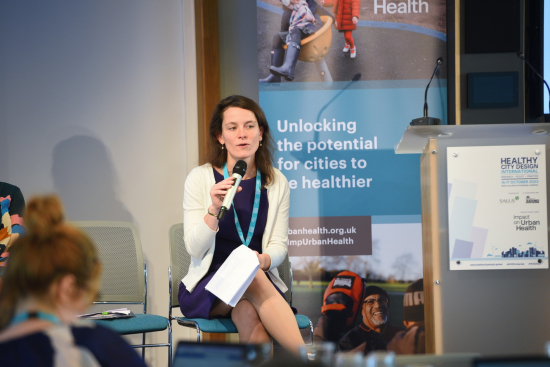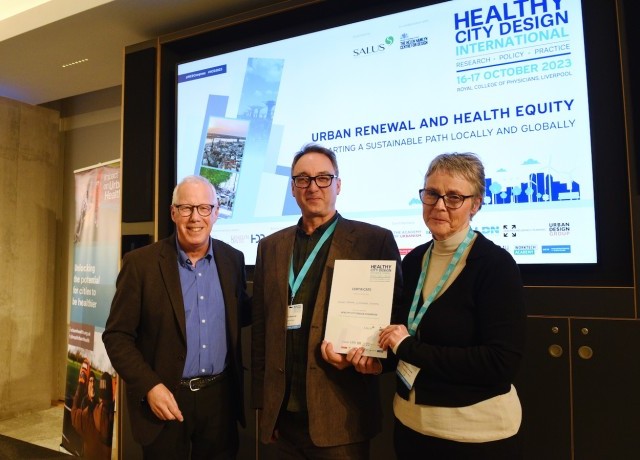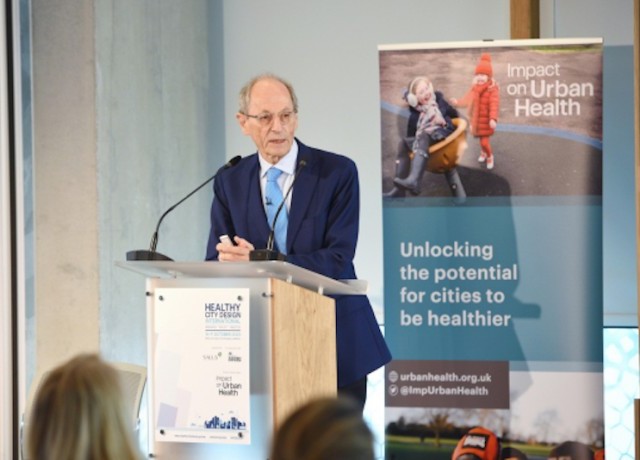
Keynote summary: Health equity and Marmot Cities
If you remove London from GDP figures, the UK’s national income is the same as Mississippi, the poorest US state. That’s according to leading authority on health inequalities Prof Sir Michael Marmot, who highlighted the startling statistic at the Healthy City Design International Congress in Liverpool earlier this month.
If you remove London from GDP figures, the UK’s national income is the same as Mississippi, the poorest US state. That’s according to leading authority on health inequalities Prof Sir Michael Marmot, who highlighted the startling statistic at the Healthy City Design International Congress in Liverpool earlier this month.
Britain’s national GDP drops by 14 per cent if you remove London, he noted. In Germany, if you remove the richest region, Munich, GDP remains fairly static. In the Netherlands, if you remove the richest region, Amsterdam, GDP falls by about 4 per cent, and in the US, it drops by about 3 per cent.
A poor country with some rich people is Sir Michael’s prognosis conclusion, so how can this situation be turned around? Explaining his approach to making change happen, Sir Michael told delegates that he finds a door, and if it doesn’t open, he doesn’t continue to bang his head against that door, he seeks out a door that does open. With this in mind, he went on to describe the UK national context over the past 15 years in regard to health inequalities and the recent development and growth of his Marmot Cities concept.
Marmot Cities are those that commit to the pursuit of eight principles, which Sir Michael identified following his commission to undertake a strategic review of health inequalities, published in 2010, and a follow-up ten years later. The original six principles were: give every child the best start in life; education and lifelong learning; employment and working conditions; make sure everyone has enough money to lead a healthy life; develop healthy and sustainable places and communities; and take a social determinants approach to ill health prevention. In the light of the Covid-19 pandemic, two further principles were added: tackle racism, discrimination, and their outcomes; and pursue environmental sustainability and health equity together.
Looking back to 2010, Sir Michael observed that the rate of change on increased life expectancy in England slowed dramatically and just about ground to a halt. In 2020, the first year of the pandemic, life expectancy fell by 0.9 years in women and 1.2 years in men. After 2010, he noted, Britain had the most marked slowdown in life expectancy of any rich country, except Iceland and the United States.
Drilling deeper into the life expectancy data also reveals a wealth gap. In England, for the least deprived decile, it doesn’t matter much where people live, Sir Michael explained, pointing to evidence that life expectancy for this group had seen a slight improvement over the period 2010-12 through to 2017-19. But for the most deprived decile, where you live is a major factor in life expectancy.
Sir Michael commented that prior to the pandemic, “life expectancy had stalled, inequalities were getting bigger, and life expectancy for the poorest was getting worse. If you agree with the proposition that health tells us a great deal about how well we are doing as a society, we were doing worse, and the inequalities in society were increasing.”
If you agree with the proposition that health tells us a great deal about how well we are doing as a society, we were doing worse, and the inequalities in society were increasing.
Austerity and its impact
In suggesting the reasons for why this has occurred, Sir Michael’s prime suspect is austerity and the policies implemented following 2010 and the 2008-09 financial crisis. He pointed out that in 2009-10, public sector expenditure as a percentage of GDP was 42 per cent. By 2019, that had fallen to 35 per cent. By comparison, in 2020, the first year of the pandemic, it went up to around 47 per cent, as the Government focused on keeping the economy stimulated to counter the effects of lockdowns and limit job losses.
In other areas, too, Britain has seen the impact of austerity. According to the Financial Times, for example, UK real wages are lower today than 18 years ago and have fared much worse than any peer nation. And healthcare spending in Britain, Sir Michael noted, fell 0.7 per cent a year from 2010, when you take account of a rising and an increasingly ageing population, and fell 0.3 per cent from 2015, up to the pandemic.
As the cost of living has surged over the past two years, data from the Joseph Rowntree Foundation and the Trussell Trust shows that the universal credit standard allowance is below the cost of basic essentials in Britain. “In other words,” said Sir Michael, “if you’re on welfare, we guarantee you will get sick. We will only give you enough to meet 70 per cent of the essentials. You’re going to have to live in a cold home, eat unhealthy food.”
Proportionate universalism and Marmot Cities
In his 2010 review, he coined the term “proportionate universalism”, a hybrid of two ideas – means-tested benefits, where you target the worst-off, and a universalist approach.
“If you focus only on the worst-off, you miss the health disadvantage of people who are above that threshold but still have a health disadvantage, because they’re relatively deprived,” Sir Michael explained. “So, I said, ‘universalist policies with effort proportionate to need’.
“What we’ve had is effort inversely proportionate to need. The greater the deprivation, the greater the need; the greater the need, the greater the reduction in spending. Could this have played a role in the slowdown in life expectancy improvement, the increase in health inequalities, the decline in life expectancy in the poorest areas? I think it could.”
Many of these issues can be addressed by cities pursuing the eight principles above that can see them become a Marmot City, and Sir Michael expressed he was encouraged by some of the local action that is happening. Forty local authorities have declared themselves Marmot Places – among them, Coventry, Greater Manchester, Cheshire and Merseyside, Luton, Leeds, and Gwent.
He added that the idea that central government can learn from what is happening in the cities, and that the cities are showing the way on population health, levelling up, and health equity, are further signs of optimism. And citing the late Welsh novelist and critic, Raymond Williams: “To be truly radical is to make hope possible rather than despair convincing.”
Event news
Investing in urban renewal and health equity
21st March 2024
Health equity: Marmot Cities
20th March 2024
Housing and health equity
20th March 2024





